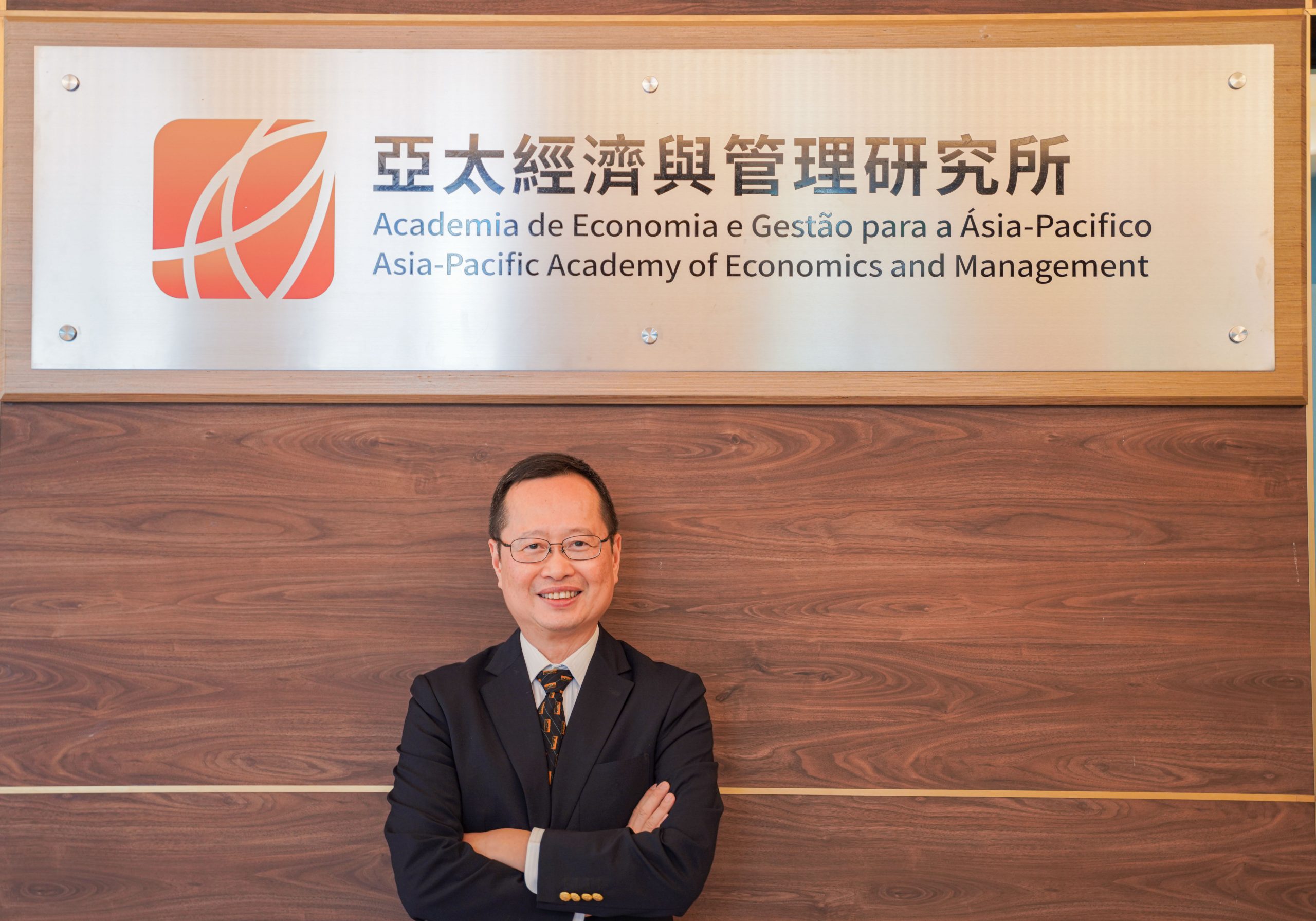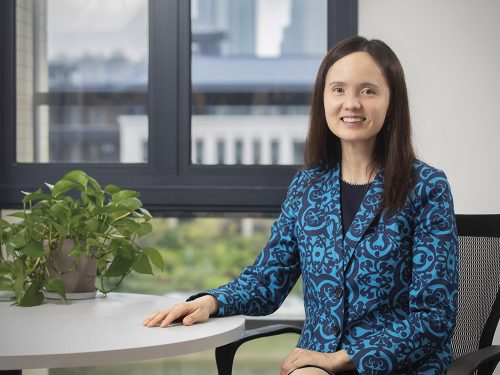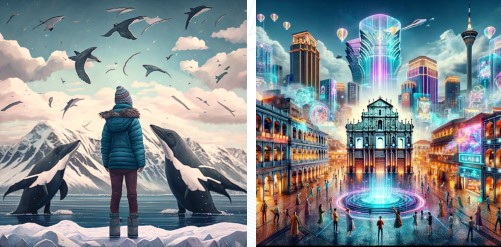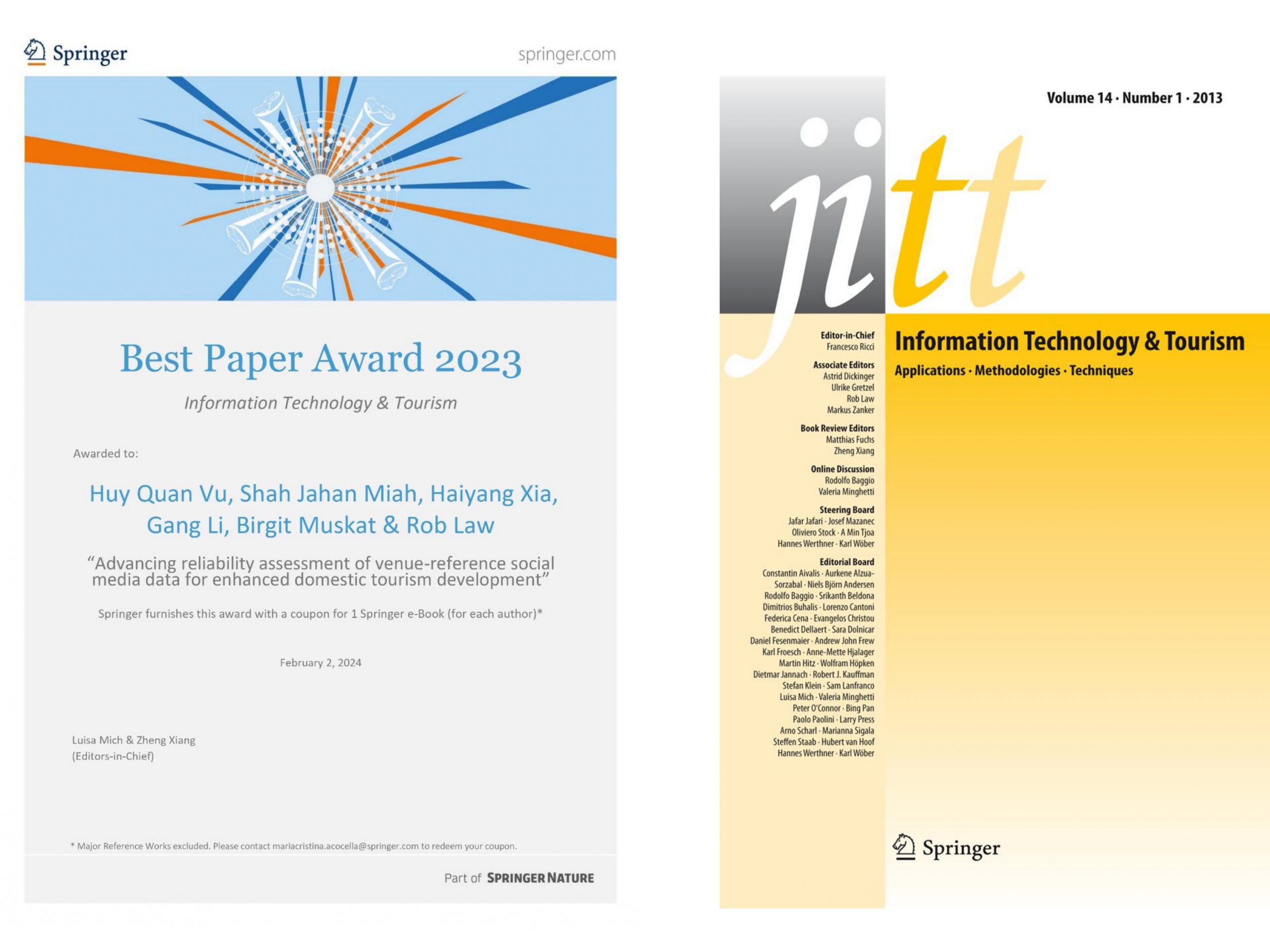
Prof. Rob Law

Prof. Li Miao

Images generated by Prof. Miao using AI drawing tools: an Asian girl travelling in Alaska (left); Macao Metaverse (right)

Prof. Law receives Best Article of the Year Award in 2023 from the Journal of Information Technology & Tourism
Since the return of Macao to China in 1999, economic focus has been gradually shifting towards developing tourism industry. In recent years, the Macao SAR government has endeavoured to promote appropriate economic diversification by focusing on the “1+4” development strategy, deepening integration across the sectors of “tourism+”, and actively promoting the development of the tourism industry. The government also vigorously promotes the building of the “World Centre of Tourism and Leisure”, which has been further enriched by being recognised as the UNESCO Creative City of Gastronomy and “The Historic Centre of Macao” on the World Heritage List.
The development of smart tourism, the adoption of information technologies such as big data and artificial intelligence, and the technological enhancement of diversified tourism experiences will play a crucial role in achieving this goal. As an international public comprehensive university, UM is committed to serving the community through research and talent development. The Smart Tourism research team of the Asia-Pacific Academy of Economics and Management of UM focuses on the research and development of smart tourism technologies and actively promotes innovation through interdisciplinary research. The Department of Integrated Resort and Tourism Management of the Faculty of Business Administration of UM focuses on nurturing integrated tourism professionals to support Macao in building a “World Centre of Tourism and Leisure”.
The Handover of Macao: Significant Changes for the Tourism Industry
The year 2024 marks the 25th anniversary of Macao’s return to China. Through the joint efforts of the Macao SAR government and all sectors of the community, there has been a gradual and steady improvement in Macao’s economy and people’s livelihood. Reflecting on the changes in Macao over the past 25 years, the gradual shift in its economic industry focus, as well as the opportunities and challenges faced by Macao after the COVID-19 pandemic, are all key points deserving attention. To promote appropriate economic diversification, the SAR government has given full play to the leading function of integrated tourism as the key pillar industry. A series of measures were introduced to promote the city’s economic recovery and to continuously striving to build Macao as a “World Travel and Leisure Centre.”
Rob Law is University of Macau Development Foundation (UMDF) Chair Professor of Smart Tourism and the Deputy Director of the Asia-Pacific Academy of Economics and Management. He has received over 100 research related awards and accolades and is considered one of the most prolific and influential scholars in the field of tourism and hospitality in the world. He believes that since the handover of Macao, the SAR government has significantly enhanced the attractiveness of Macao tourism by placing various measures in exploring diversified tourism markets and improving tourism facilities and services. He points out, “Macao is rich in tourism resources, including historical and cultural heritage, culinary delights, entertainment, and cultural activities. Coupled with the high-quality accommodation services provided by the city’s renowned hotel brands and convenient transportation infrastructure, more tourists are drawn to visit Macao. In recent years, the government has also been launching new tourism products and services, such as cultural festivals, theme parks, and cultural and creative activities, to offer visitors a more diversified travel experience.”
Professor Law believes that despite the ever-changing forms of tourism, the fundamental nature of visitors to Macao will remain unchanged. He states, “Macao has its own unique advantages. Today, as in the past, the majority of visitors come from the Greater Bay Area of mainland China. It is mainly because Macao is a small place with diverse attractions, making it a convenient and cost-effective travel destination for short getaways to tourists from mainland China. It can be said that there are very few competitors who can outperform Macao.”
Post-pandemic Macao: Changes in New Business and Smart Tourism Development
The outbreak of COVID-19 in 2019 led to a sharp decline in visitor arrivals to Macao, but travel demand has gradually recovered in recent years as the global pandemic has been brought under control. Professor Law believes that the pandemic has accelerated the development of smart tourism. In order to adapt to the new tourism environment, the government has actively promoted digital tourism and online marketing campaigns, which has fostered the development of smart tourism and the emergence of metaverse tourism.
According to Professor Law, smart tourism is defined as using technology to enhance tourists’ perceptions and enrich their travel experience. He explains, “Smart tourism encompasses the entire journey, including clothing, dining, accommodation, and transportation. It starts from online information search before departure, to enjoying the travelling process upon arrival at the destination, and sharing the experience on social media after departure. The use of technology enables faster, more accurate, and wider information exchange. It provides tourists with convenient, comfortable, and personalised travel experiences, ultimately raising both the service level and quality of the tourism industry.”
Professor Law expresses that the development of smart tourism can help to enhance the travel experience and improve tourism carrying capacity. It is crucial for facilitating the sustainable development of the tourism industry in Macao, as well as consolidating its position as a “World Centre of Tourism and Leisure”. He emphasises, “The implementation of smart tourism will significantly enhance the convenience, involvement, and quality of travel. Through the smart applications for visitor flows, it assists tourists in accessing travel information in advance, anticipating visitor flow at landmarks, and enjoying personalised travel services. On the other hand, smart tourism can also improve the efficiency of utilizing tourism resources, protect the tourism carrying capacity of landmarks and the environment through intelligent management and monitoring methods. It can help control the number of visitors within the environmental carrying capacity through intelligent pre-sale ticketing and diversion measures at landmarks.”
Li Miao, UMDF Professorial Fellow of Integrated Resort and Tourism Management and Head of the Department of Integrated Resort and Tourism Management of the Faculty of Business Administration, believes that post-pandemic Macao has witnessed new changes in the tourism industry and the emergence of various new forms of tourism. She cites examples, “For instance, there are now the very popular ‘special forces travel’, where people can embark on spontaneous journeys at any moment, and city walks, where people seek the extraordinary in ordinary life.” Professor Miao believes that these examples reflect the changes in people’s perception and experience of travelling, highlighting the importance of travel and leisure in their lives. She emphasises, “Although the forms of travel have been constantly changing, what has remained unchanged throughout ages is that travelling is an innate human need and an integral part of life.”
Enhancing Sensory Experience of Travelling with Technology, Deepening Human-Technology Interactive Experience
With the development of artificial intelligence (AI), augmented reality (AR) and virtual reality (VR) technologies have deepened the application of tourist spaces by enabling the integration and interaction between physical and virtual space. Professor Miao emphasises the importance of using advanced technologies to empower the tourism industry. It aims to provide tourists with a completely new sensory experience by leveraging Macao’s rich world cultural heritage and its integration between Eastern and Western cultures. Professor Miao says, “In the past, we could only see the Ruins of St. Paul’s as a relic that could not be further interacted with. But now, through the use of technology to create a sense of space, such as using online VR galleries and AR applications to provide interactive information about historical sites, tourists can enjoy a different immersive sensory experience in the same space.”
Professor Miao focuses on research into the interactive experience between humans and technology. She is enthusiastic about exploring the impact of AI on people’s memories of travel destinations. Using AI drawing tools to generate images depicting travel destinations based on her imagination, Professor Miao discovered that, “Even though I have been to travel destinations such as Alaska in person and had seen the real scenery there, what I remember in my mind is the image presented by AI based on my descriptions, illustrating how human travelling memories and experiences can be altered and created through technology.”
In-Depth Cooperation between Guangdong and Macao in Hengqin: Explore Diversified Tourism Markets
To promote appropriate economic diversification in Macao, the “General Plan for Building a GuangdongMacao In-Depth Cooperation Zone in Hengqin” mentions that it will continue to speed up the tourism cooperation between Macao and Hengqin, and jointly create a Greater Bay Area tourism brand through the development of the Cooperation Zone.
Professor Law suggests in achieving the integration, linkage, and complementarity of tourism resources between Hengqin and Macao, combining Macao’s rich cultural and entertainment resources with natural scenery in the Greater Bay Area, and jointly promoting cooperation in cross-border tourism products. In addition, tourism industry alliances can be established to jointly develop diversified markets through the sharing of resources and market information, targeting emerging markets such as the younger generation and cultural experience tourists. The development of new travel businesses such as aerial photography by drones and VR experiences can also be promoted to satisfy tourists’escalating consumption demands. Furthermore, there is huge potential for Hengqin and Macao to jointly develop “smart MICE (MICE refers to Meetings, Incentives, Conferences, and Exhibitions)”. Macao can learn from Shenzhen in providing value-added information services to MICE participants by leveraging mature technologies in the Greater Bay Area, such as 5G, Internet of Things (IoT), and data mining. The two places can also strengthen cross-border transport support and enhance the convenience of customs clearance policies through actions such as increasing the number of cross-border coaches and issuing more vehicle license plates for seamless travel between Hengqin and Macao.
Professor Law expresses that Macao, as a gateway from the mainland to overseas, can leverage the advantages of the “One Country, Two Systems” policy to strengthen cooperation with mainland and overseas tourist destinations. At the same time, Macao can actively participate in the Belt and Road Initiative, utilising its geographical advantages and characteristics as a port to become a hub for trade and cultural exchanges between China and other countries. In addition, Macao can actively host international conferences, cultural exchange activities, sports events to attract more foreign tourists and investments. Furthermore, promoting the integrated development of “tourism+” between tourism and emerging industries including MICE, culture and creativity, e-commerce, and sports, achieving greater synergy and enhancing Macao’s international reputation and influence.
Smart Tourism Research and Talent Development: Empowering the Development of the Tourism Industry in Macao
To promote appropriate economic diversification in Macao, the SAR government focuses on deepening integration across sectors of “tourism+” and encourages the establishment of higher education programmes that align with industry development. Through research on smart tourism and talent development, UM strives to contribute to the development of the tourism industry in Macao.
The Asia-Pacific Academy of Economics and Management (APAEM) of UM focuses on the research and development of smart tourism technologies, including areas in big data analytics and AI. It has adopted a series of measures such as hosting international conferences and seminars, publishing research reports, and collaborating with the industry. Professor Law states that the team has already initiated research on topics related to the development trend of the tourism industry, smart tourism technology applications, and visitor behaviour analysis. It aims to provide more strategies and recommendations for the development of the tourism and leisure sector in Macao as well as the application of smart tourism technologies. In the future, APAEM will further deepen its research on smart tourism technologies, conduct research projects on sustainable tourism development and visitor experience enhancement. It will also strengthen cooperation with the government and tourism operators, and actively expand cooperation and exchanges with mainland and overseas tourist destinations to create a cross-border academic community.
UM has established the Department of Integrated Resort and Tourism Management in 2019 to support the development of integrated tourism professionals to meet the needs of tourism enterprises and the market. Professor Miao, serving as the Head of the Department, states that the curriculum design of the department will be continuously adjusted according to future demands, leveraging the University’s strengths in disciplines such as computer science and big data analytics, as well as strengthening cutting-edge elements such as “tourism+”. Professor Miao says, “The future of Macao’s tourism industry requires generalists who are well versed in a wide range of knowledge and can further extend their application skills from knowledge acquisition. By empowering humans with advanced technology, we will free ourselves from repetitive tasks and fully unleash creative thinking that cannot be replaced by machines.”

